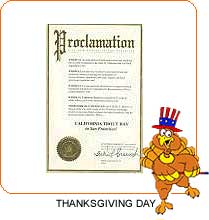
 “Whereas it is the duty of all nations to acknowledge the providence of Almighty God, to obey His will, to be grateful for His benefits, and humbly to implore His protection and favor; and Whereas both Houses of Congress have, by their joint committee, requested me "to recommend to the people of the United States a day of public thanksgiving and prayer, to be observed by acknowledging with grateful hearts the many and signal favors of Almighty God, especially by affording them an opportunity peaceably to establish a form of government for their safety and happiness:"
“Whereas it is the duty of all nations to acknowledge the providence of Almighty God, to obey His will, to be grateful for His benefits, and humbly to implore His protection and favor; and Whereas both Houses of Congress have, by their joint committee, requested me "to recommend to the people of the United States a day of public thanksgiving and prayer, to be observed by acknowledging with grateful hearts the many and signal favors of Almighty God, especially by affording them an opportunity peaceably to establish a form of government for their safety and happiness:"
Now, therefore, I do recommend and assign Thursday, the 26th day of November next, to be devoted by the people of these States to the service of that great and glorious Being who is the beneficent author of all the good that was, that is, or that will be; that we may then all unite in rendering unto Him our sincere and humble thanks for His kind care and protection of the people of this country previous to their becoming a nation; for the signal and manifold mercies and the favorable interpositions of His providence in the course and conclusion of the late war; for the great degree of tranquility, union, and plenty which we have since enjoyed; for the peaceable and rational manner in which we have been enable to establish constitutions of government for our safety and happiness, and particularly the national one now lately instituted' for the civil and religious liberty with which we are blessed, and the means we have of acquiring and diffusing useful knowledge; and, in general, for all the great and various favors which He has been pleased to confer upon us.
And also that we may then unite in most humbly offering our prayers and supplications to the great Lord and Ruler of Nations and beseech Him to pardon our national and other transgressions; to enable us all, whether in public or private stations, to perform our several and relative duties properly and punctually; to render our National Government a blessing to all the people by constantly being a Government of wise, just, and constitutional laws, discreetly and faithfully executed and obeyed; to protect and guide all sovereigns and nations (especially such as have show kindness to us), and to bless them with good governments, peace, and concord; to promote the knowledge and practice of true religion and virtue, and the increase of science among them and us; and, generally to grant unto all mankind such a degree of temporal prosperity as He alone knows to be best.
Given under my hand, at the city of New York, the 3rd day of October, A.D. 1789.”
(signed) G. Washington
While there were many observances regarding Thanksgiving, the first historic proclamation was issued by President George Washington on 3rd October 1789, during his tenure. According to it, November 26 was declared as 'A day of public thanksgiving and prayer'. The day was to be observed by people by thanking God and being grateful for his favours.
Seventeenth century witnessed a common practice for individual colonies to observe days of thanksgiving throughout each year. It was a day set aside for prayer and fasting, not a day marked by plentiful food and drink as is today's custom. Later in the 18th century each of the states periodically would designate a day of thanksgiving in honor of a military victory, an adoption of a state constitution or an exceptionally bountiful crop.
Such a Thanksgiving Day celebration was held in December of 1777 by the colonies nationwide, commemorating the surrender of British General Burgoyne at Saratoga.
On October 3, 1863, President Abraham Lincoln issued a fresh proclamation calling for the observance of the fourth Tuesday of November as a national holiday. Later, President Franklin D. Roosevelt moved the holiday to the third Thursday of November (to extend the Christmas shopping season and boost the economy)in the year 1939. After a storm of protest, Roosevelt changed the holiday again in 1941 to the fourth Thursday in November, where it stands today.